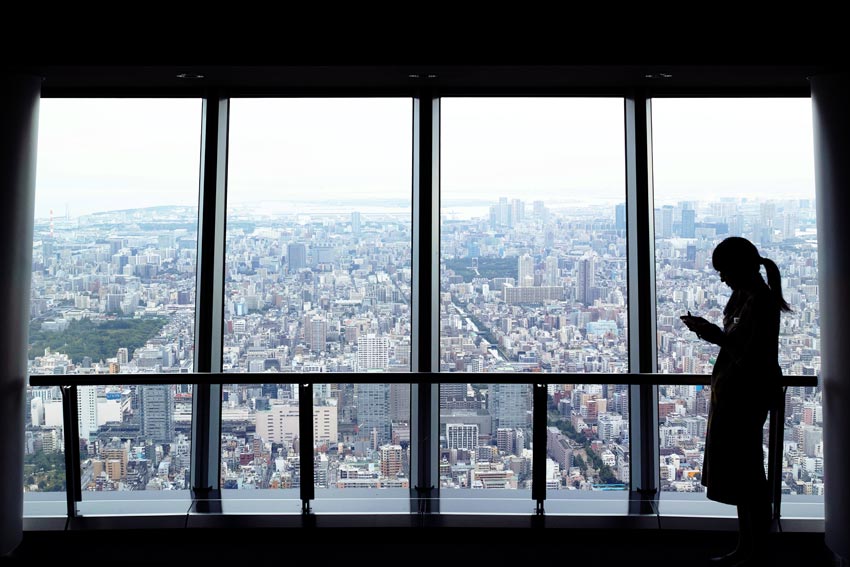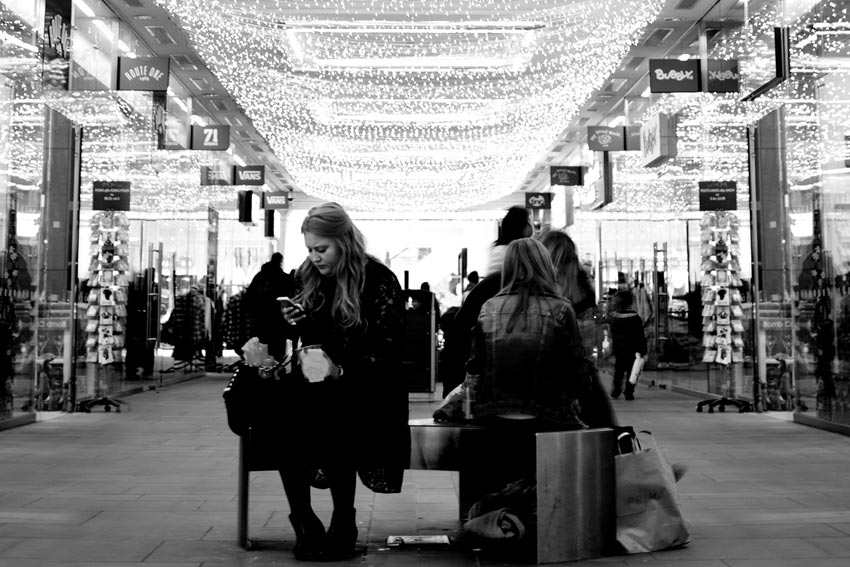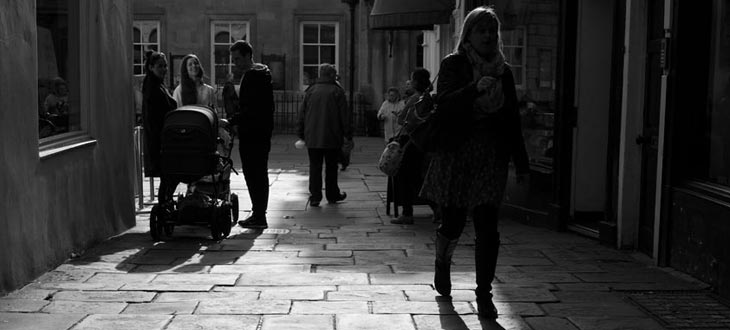Photographers by nature love to take photos of the world around us - it's what we do. Here in the UK there isn't one single law governing photography, so you're free to take whatever photographs you want, providing you don't breech any other laws, civil or criminal, in the operation of taking photographs and publishing them. And that's where most of the restrictions come from, not from the process of composing, framing and recording something on your CCD. So why are photographers up and down the country petrified of taking their cameras into the streets and claiming back the cities as their favourite photographic playground? The answer is fear-fear of being labelled a pervert, fear of being wrongly arrested and fear of being sued. Keep reading and take your first steps towards reclaiming the streets...
On The Streets
In the UK, the term `public land' doesn't really ring true. All land is owned, even if it's open to the public permanently. The roads and pavements may be paid for by our taxes, but the Queen technically owns them. There's no particular law governing photography in the UK, so shooting from a public space isn't generally restricted. The restrictions usually arise when you begin to shoot for commercial gain. It could be that operating a business (which a photo-shoot technically is), in your local park is forbidden by law. Although it's hard for authorities to police the situation, a quick phone call to the relevant council or authority will tell you if you need a permit or have to pay a fee. However, unless you're a huge advertising photographer with massive lighting rigs, preventing the public going about their business, we'd be surprised if there were any problems. The exceptions to this in the UK are Trafalgar Square and some Royal Parks where filming and photography bylaws are ruthlessly enforced to prevent photography for business, trade, profession or employment purposes. However, you'll be free to enjoy photographing for personal pleasure - even with a small tripod. Private property, on the other hand, is generally any area that the public doesn't have regular and unobstructed access, such as a private dwelling or business premises. However, private land can also include a place where the public expects free access, such as a graveyard, but it will ultimately be private property. With permission from the owner, taking photographs from private land is generally the safest option for commercial photography, especially if you've got that permission in writing.Church From A Graveyard
Photographing a church from the publicly accessed but private property of the graveyard is fine for non-commercial use. If you're asked to leave by the owner then you must, or risk trespassing. If you want to use the image commercially you'll need permission from the owner first.Church From A Public Highway
There's no criminal or civil law to stop you taking a shot of the building. You don't even need the permission from the owner for non-commercial use and they can't physically stop you taking photographs or move you on. However, if you want to use the image for commercial use you'll need permission from the owner before placing it with your picture agencyOutside A Tube Station
Photographing any building, area or installation that isn't deemed a 'prohibited place' as defined in the Official Secrets Act 1911 is allowed, providing it's not useful to an enemy. However, there's an increased chance you'll be asked what you're doing or even asked by the police or security to stop photographing.Children In A Park
Taking pictures of children inside a public park isn't a crime. For non-commercial use it's fine, as long as the pictures are decent and there are no bylaws that prevent photography. If there are bylaws in place than you'll need to seek prior permission from the authorities. You'll also need permission if you're shooting commercially.Children From A Public Highway
Decent photographs of children from a public place are fine for non-commercial use. Don't shoot covertly with a long lens and be aware of worried parents and over-zealous officials. If you'd like to use the images commercially you'll need to get a model release form signed by any parents of the children pictured.Flowers Inside A Field
Most fields, and indeed all farmland in the UK, are privately owned property. If shooting within the boundaries of a farmer's field without permission, you'll risk trespassing, unless you're on a designated and clearly marked public footpath. Shooting the flowers from the public road is fine, even though they're on private property.Street Scenes Of Prominent Places Or Monuments
You're free to take pictures for non-commercial use although some areas have restrictions for commercial photography (see main copy on this page) and you'll need to seek permission from the relevant authority or organisations. Expect to either pay a fee or hand over your copyright for commercial use.Street Candids Around Towns Or Cities
Photographers are free to take photos of people in public places commercially or non-commercially and there's no criminal law in the UK that prevents this. However, if you'd like to shoot commercially then a model release form, and in some cases a building release form, will have to be sought to enable you to publish or sell images.
Questions And Answers
So, it's a lovely day for photography and you're out on the streets taking pictures and enjoying your hobby. What happens if someone objects to you taking pictures of them? How do you know if you're not trespassing? Do you need to have a photography permit? As passionate photographers these are all situations we're bound to find ourselves in, so here are some answers to those often sticky questions.How do you know if you're not trespassing?
Do you need to have a photography permit? As passionate photographers these are all situations we're bound to find ourselves in, so here are some answers to those often sticky questions.I love taking photos of trains from stations. Can I still do that?
Yes. Taking photographs on stations is permitted, providing it's for non-commercial use only. For any other photography, prior permission must be sought from the appropriate train operator or Network Rail. There are rules and regulations to adhere to and you'll have to inform the station duty manager of your presence. This is best practice even when shooting for non-commercial. Visit www.nationalrail.co.uk for more information.Where does the public highway begin and end?
Usually the public highway is from the edge of one private property to the opposite private property edge and includes not just the road where cars travel, but also everything in between. This also includes any land that the public has a right to pass and re-pass for the purpose of legitimate travelling.Can I be arrested for harassment by taking someone's photo?
Yes. The laws surrounding harassment aren't designed to stop people taking photographs, but taking photographs of someone could amount to harassment. For a harassment offence to have been committed, the behaviour must have occurred on at least two separate occasions. In a street situation, especially shooting candids, this is unlikely to happen if someone initially objects to having their picture taken. For more info, visit www.cps.gov.uk and www.statutelaw.gov.ukWhat should I do if the police stop me taking pictures?
The police in the UK can't stop you taking photographs, but there are other laws you could be arrested and imprisoned for, as a result of taking photographs - the Official Secrets Act being one of many. Be courteous and explain what you're doing - that should be enough to satisfy them you're a genuine photographer. An officer may wish to search you in connection with the 'stop'. They can only do this if they suspect you're carrying drugs, weapons, stolen property or items that could be used to commit a crime, commit an act of terrorism or cause criminal damage. Searches carried out under Section 44 of the Terrorism Act 2000 are much more serious and the police have to observe very strict guidelines if they suspect you of carrying articles that could be used in connection with terrorism.Can I be arrested for invading someone's privacy?
No. There are no privacy laws in the UK. However, there are laws that indirectly affect publication, such as libel, copyright, confidentially and harassment. The Press Complaints Commission (an independent body, which deals with editorial content of magazines and newspapers, but not private individuals) has a code of practice. In this, it advises the following: "It is unacceptable to photograph individuals in private places without their consent." The PCC defines a private place as: "Public or private property where there is a reasonable expectation of privacy." For more information, visit www.pcc.org.uk.Do I need a licence take photographs in the street?
Digital cameras aren't like guns, you don't need a permit or licence to own one, carry one in public or shoot one. The confusion usually arises when an area has a bylaw stating any commercial photography is restricted and you must have a permit, such as the Royal parks and Trafalgar Square, to carry out commercial photo shoots.How will I know if I'm trespassing on private property?
The chances are you may not as lots of private land isn't clearly marked. Unless you're absolutely sure that you're on the public highway, where trespass laws don't extend, be cautious. If you're on private land and the owner asks you to leave, then failure to do so will be classed as trespass. They can also use reasonable force to make you leave the land, but this doesn't include grabbing or smashing your camera gear. Also note that it's a criminal offence to commit trespass on railway or military property and some politicians' and royal property in the UK. Visit www.ramblers.org.uk for more info.I like taking pictures of people - do I need to be worried by libel?
If you publish your photographs then yes. And that doesn't just mean in print form or the web - just one other person needs to see the image to constitute as being published. The majority of instances where libel is an issue will be in your image title or a caption. For example, taking a candid shot of a scruffily dressed person lying down on a park bench, giving it the title `Homeless drunk sleeping' and sticking it on an online gallery will leave you wide open for libel action. How do you know the person was homeless? How do you know they were a drunk? Are you even sure they were sleeping? Never use conjecture in titles or captions, use facts only. If in doubt, don't use a title and leave the caption blank. As the law is vast and constantly changing regarding libel, we strongly recommend further reading and research on this subject before publishing your photographs. Always seek legal advice from a solicitor.I love civil and military aircraft. Can I photograph them?
Like railway stations, airports are private property so restrictions will apply for all photography at an airport. Private and personal use will generally only be allowed in the terminal lounges. Taking photos of security equipment will land you in hot water, so don't do it. Most civil airports have viewing areas outside the boundaries and are happy for you to take photographs of aircraft. The same restrictions apply to civil ports, so be cautious and, if in doubt, ask an official first. Military airfields or any establishment that has a military or government purpose should be avoided without express permission to photograph them.I love taking animal photos at the zoo - am I allowed?
Zoos are private property and will have their own restrictions they're free to impose on photographers. As a general rule, most zoos will allow photography for private and personal use. You'll need express permission for commercial photography and it will usually require payment of a fee. Check with the zoo before you visit.If I'm asked to wipe my memory card do I have to do it?
No. You're not obliged to delete any images from your memory card. Any member of the public who demands you should and uses threatening behaviour could be committing assault. Similarly, if they use force to take your camera or memory card then not only could they commit assault, but also the civil tort of trespass to goods and trespass to person. If they withhold your camera or memory card permanently then it is, of course, theft and a serious criminal offence. In this situation it's advisable to call the police as soon as possible. The police don't have the power to make you delete images from your memory card either. Inform them that the images contained on your memory card are private property and they have no right to destroy them. There could also be a case that if you are arrested you'll need the images on your card as evidence of what you've been photographing.I've paid for the ticket so why can't I take photos at gigs?
This is often a restriction imposed for a variety of reasons relating to the enjoyment of other spectators or disturbing the performance, not a copyright issue. As we've mentioned, private premises can place whatever restrictions they choose upon entering the venue, so banning photography is completely acceptable. If you do decide to take pictures you could be treated as a trespasser ab initio - legal jargon meaning `from the beginning', which means you've acted contrary to the purpose for which the invitation was given to enter and can be forced to leave the venue.Someone stopped me from taking photographs of their house, even though they weren't in the picture - can they do this?
As long as you're not committing any other offence, such as trespass by climbing, or even leaning against their property then they can't legally stop you taking photographs. If they try to do so forcibly then they'll be committing assault and you should call the police. Note that they could stop you trespassing using reasonable force.What's the difference between commercial and non-commercial photography?
There's no real clear-cut photographic or legal definition between the classifications upon the point of image capture, and this is where the area becomes very cloudy. A photograph that may be taken for personal and private use at the time the shutter was pressed could be used in the future in a non-commercial or commercial use. In the case of taking photographs from private property, where permission to shoot for commercial use was not given, subsequent commercial gain could result in the owner seeking losses or a percentage of your commercial gain through the courts. NON-COMMERCIALNon-commercial photography is classed as any photograph taken or image you make for which you don't receive commercial reward or gain. This includes competition entries taken in good faith.
COMMERCIALCommercial photography is everything else, including advertising, T-shirts, commissioned work for corporate or private clients, flyers, shooting images to sell on your website digitally or sell on as prints.


